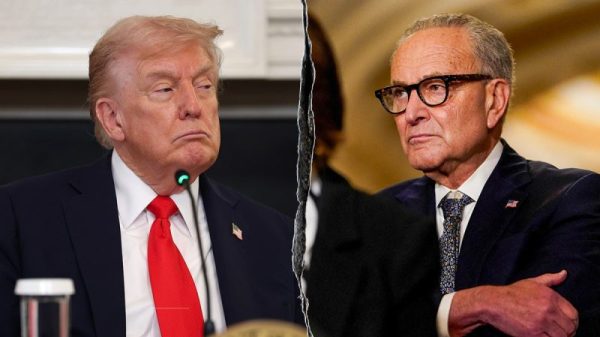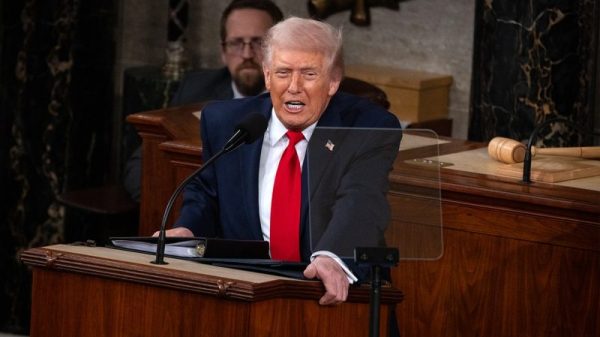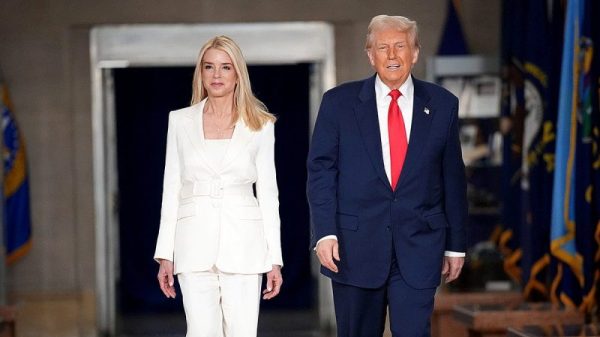Craig Barrett was a little star-struck, he confessed, when he answered the door at his Northern Virginia townhouse to find a Trump whistleblower standing outside.
“It’s an honor to meet you, sir,” he said as former Army colonel Yevgeny “Eugene” Vindman handed him a campaign brochure. “Hold on, hold on — I’ve got to get a picture, if you don’t mind.”
Vindman, who made his pitch for Congress while they posed for a photo, is no stranger to this kind of fame: He helped his brother file a report that prompted the first impeachment inquiry into President Donald Trump — and then thrust the identical twins into the Washington spotlight.
An hour or two away from the cameras on Capitol Hill, Vindman has used his celebrity to catapult to the front of a crowded Democratic primary for Virginia’s 7th Congressional District. His campaign has raised more than $3.7 million in his bid for this battleground seat, left open because Rep. Abigail Spanberger (D-Va.) is running for Virginia governor.
But with four other Democrats stressing their track record in elected office, the June 18 primary will test whether Vindman’s role in the anti-Trump “resistance” — and the thousands of donations it has netted him from around the country — is enough to win the party’s nomination.
Those four candidates — state Del. Briana Sewell, former state delegate Elizabeth Guzman and Prince William County supervisors Andrea O. Bailey and Margaret A. Franklin — are all women of color who have represented the most heavily Democratic corner of the district. None has raised more than a fraction of Vindman’s war chest, but each contends she has stronger ties to this diverse, growing area than the former Army colonel, who moved to the area in 2016.
“Vindman did just kind of drop out of the sky,” Elizabeth Warner, a retired scientist and school board member in Stafford County, said in an interview during a convention in Fredericksburg for 7th District Democrats last month. “I recognize he has the money and the backing, but I’m not sure he’s the best candidate for the job.”
Alex Keena, a political scientist at Virginia Commonwealth University in Richmond, said that the conventional wisdom would place Vindman as the odds-on favorite. “Money tells you one story, and Vindman has a lot of it,” he said. “But money doesn’t always guarantee success,” he added, and the other front-runners “have actual constituents who live within the district boundaries. I wouldn’t underestimate the power of that.”
The stakes will be high in November for whoever wins. Democrats cannot afford to give up the 7th District, a mix of bedroom communities along Interstate 95 and rural areas in the Virginia Piedmont, to successfully flip the House this fall. The Cook Political Report gives Democrats only the slightest of advantages in the general election.
Republicans are in the middle of their own crowded primary, led by two well-funded military veterans with experience in the Trump administration. The eventual nominee is bound to receive heavy support from national GOP efforts, who have already directed several attacks at Vindman over his time in the Army.
Vindman, though, has not shied away from putting a different frame on his time in the spotlight. He said the race is just as much about defending democracy as it is about local issues, with Trump all but certain to win the GOP’s presidential nomination.
“There’s too much at stake this time around, and I couldn’t sit on the sidelines,” Vindman told Barrett, 50, the voter who asked for a photo.
Barrett, a lawyer and former Marine who lives near Woodbridge, said the retired Army colonel had won his vote by demonstrating courage in raising alarms about Trump.
Yet as Vindman listed who else was running, he nodded along in recognition. Bailey is Barrett’s representative on the Prince William board. Sewell and Guzman were familiar names from his time living in the area.
All three, Barrett said, had their own merits, too.
The story presented in Vindman’s campaign ads is already familiar to many voters: The candidate’s twin, Lt. Col. Alexander Vindman, was working at the National Security Council when he overheard a call in which Trump pressured Ukraine to dig up dirt on Joe Biden.
Eugene Vindman, then a senior ethics official, filed a whistleblower report, prepared his brother to testify during impeachment hearings and was later ousted from his job following the inquiry.
It is a narrative that turned him into a fundraising juggernaut almost immediately after launching his campaign, fueled by a slew of small-dollar online donations and big-name endorsements from the likes of Rep. Adam Schiff (D-Calif.).
That huge war chest has allowed him to get his message out in every corner of this sprawling district, but it has also put Vindman, 48, under the microscope as Democrats consider how an untested candidate with his profile would perform in November.
Members of both parties slammed him for posing in April with a Confederate-era version of the Virginia state flag — a gaffe for which he later apologized — and pointed out that the overwhelming majority of his grass-roots donations have come from outside Virginia. Guzman’s campaign has alluded to outside spending on his behalf from “crypto super PACs,” though Vindman is quick to note that he has no control over outside groups.
Most prominently, some local officials have accused Vindman of staying on the political sidelines, questioning why he did not vote in some party primaries even after leaving the military or help canvass in competitive elections. (Vindman says he attended a fundraiser last fall for Sewell, now one of his opponents, and door-knocked outside the 7th District.)
“Everybody else has literally been boots on the ground: They have won the hard fought primaries. They have been involved,” said Del. Joshua Cole (D-Stafford). “Vindman has national recognition because of the work his brother did, but at the end of the day, we also want someone who’s going to fight for our issues.”
Sandra Smith, 80, a tour guide and retired teacher in Gordonsville, was split between several candidates, but said Vindman had put in the work to reach out to more rural pockets of the district.
“Vindman was the first guy to get down here: He was on the phone. He was in our Christmas parade,” she said. Pointing to her T-shirt, which displayed the text of the Constitution, she added: “He doesn’t need to prove himself. He’s already proven himself.”
Elsewhere at the Fredericksburg convention, it was easy to see why the other candidates had strong appeal with Democratic loyalists — and why it’s been a struggle for any one of them to break out of the pack.
Vindman was noticeably absent — he was at a fundraiser that day — but nearly every other primary candidate dropped by to hobnob with party stalwarts.
Guzman, 51, gave a rousing speech in which she declared herself the only candidate in the race to have flipped a competitive seat or represented rural areas. A favorite of labor unions and Latino groups, the social worker and former state delegate has been marshaling their support.
Some Democrats have worried voters may be growing weary after her narrow loss in a state Senate primary last year, but Guzman framed it as an advantage: A large chunk of the electorate is already familiar with her, she said, given that high-profile election and her three terms in Richmond — plus a Spanish-language response she gave to the 2018 State of the Union.
Sewell, 34, has emphasized her community ties — she lives in the same Prince William house that her parents brought her home to as a newborn — and her résumé working for federal and local politicians before getting elected to the General Assembly in 2021.
The cousin of U.S. Rep. Terri A. Sewell (D-Ala.), she was trailing the other elected officials in fundraising as of March but has drawn growing buzz in recent months — as well as praise for her poise and nuanced positions in candidate forums.
Franklin, 38, a lobbyist and former Hill staffer, began a speech at the convention by admitting that she can be quiet compared to some of her competition. Yet no one else in the race, she said, could match her combination of policy chops and lengthy track record legislating at the local and federal levels on issues like housing and gun control.
“All of the Democrats are running — we believe in the same issues,” she told the crowd. “What you are going to have to decide is who can be effective day one in addressing those issues.”
Bailey, 69, presented something of a mirror image to her Prince William board colleague: She has a shorter list of legislative accomplishments but came off as a natural onstage, drawing whoops from Democratic activists as she spoke about her work pushing for a new mental health facility in her district.
Jacob Rubashkin, deputy editor of the nonprofit analysis site Inside Elections, said that the race could look very different with one or two strong contenders with a distinct message against Vindman. But none of the four have raised enough money to match his campaign’s barrage of television ads and mailers — or attract the attention of outside PACs that might be able to help bridge that gap.
“It doesn’t help that they are all overlapping in some ways in their territory,” Rubashkin said. “Everyone is kind of vying for a similar pool of voters.”
The other two candidates in the 7th District primary — Greene County lawyer Carl Bedell and retired diplomat Clifford Heinzer — have both played up their centrist politics but have not raised enough to compete seriously.
The lingering questions for many loyal Democrats observing the crowded field is how Vindman — if he does win the primary — might fare in the general election.
Some at the Fredericksburg convention said they worry so much emphasis on Trump might turn off the kinds of independents and moderates who powered Spanberger’s victories. Others fret that on-the-ground activists may not necessarily support him as enthusiastically as they backed her in 2022.
“All of us here paid our dues, and he has not,” said Anthony Gitalado, 38, a federal employee in Stafford.
But Vindman was more confident in an interview a few days later at a Woodbridge restaurant. Democratic voters, he said, wanted a candidate who had shown he can stand up to the likely GOP nominee.
“The most important thing in this election is that we defeat Trump and MAGA extremists,” he said. “Let’s think about who is in the best position to make sure that we hold this critically important seat.”
As he went on, a couple walked over from an adjacent table, apologizing for the interruption. They had spotted him and wanted a selfie.
Craig Barrett was a little star-struck, he confessed, when he answered the door at his Northern Virginia townhouse to find a Trump whistleblower standing outside.
“It’s an honor to meet you, sir,” he said as former Army colonel Yevgeny “Eugene” Vindman handed him a campaign brochure. “Hold on, hold on — I’ve got to get a picture, if you don’t mind.”
Vindman, who made his pitch for Congress while they posed for a photo, is no stranger to this kind of fame: He helped his brother file a report that prompted the first impeachment inquiry into President Donald Trump — and then thrust the identical twins into the Washington spotlight.
An hour or two away from the cameras on Capitol Hill, Vindman has used his celebrity to catapult to the front of a crowded Democratic primary for Virginia’s 7th Congressional District. His campaign has raised more than $3.7 million in his bid for this battleground seat, left open because Rep. Abigail Spanberger (D-Va.) is running for Virginia governor.
But with four other Democrats stressing their track record in elected office, the June 18 primary will test whether Vindman’s role in the anti-Trump “resistance” — and the thousands of donations it has netted him from around the country — is enough to win the party’s nomination.
Those four candidates — state Del. Briana Sewell, former state delegate Elizabeth Guzman and Prince William County supervisors Andrea O. Bailey and Margaret A. Franklin — are all women of color who have represented the most heavily Democratic corner of the district. None has raised more than a fraction of Vindman’s war chest, but each contends she has stronger ties to this diverse, growing area than the former Army colonel, who moved to the area in 2016.
“Vindman did just kind of drop out of the sky,” Elizabeth Warner, a retired scientist and school board member in Stafford County, said in an interview during a convention in Fredericksburg for 7th District Democrats last month. “I recognize he has the money and the backing, but I’m not sure he’s the best candidate for the job.”
Alex Keena, a political scientist at Virginia Commonwealth University in Richmond, said that the conventional wisdom would place Vindman as the odds-on favorite. “Money tells you one story, and Vindman has a lot of it,” he said. “But money doesn’t always guarantee success,” he added, and the other front-runners “have actual constituents who live within the district boundaries. I wouldn’t underestimate the power of that.”
The stakes will be high in November for whoever wins. Democrats cannot afford to give up the 7th District, a mix of bedroom communities along Interstate 95 and rural areas in the Virginia Piedmont, to successfully flip the House this fall. The Cook Political Report gives Democrats only the slightest of advantages in the general election.
Republicans are in the middle of their own crowded primary, led by two well-funded military veterans with experience in the Trump administration. The eventual nominee is bound to receive heavy support from national GOP efforts, who have already directed several attacks at Vindman over his time in the Army.
Vindman, though, has not shied away from putting a different frame on his time in the spotlight. He said the race is just as much about defending democracy as it is about local issues, with Trump all but certain to win the GOP’s presidential nomination.
“There’s too much at stake this time around, and I couldn’t sit on the sidelines,” Vindman told Barrett, 50, the voter who asked for a photo.
Barrett, a lawyer and former Marine who lives near Woodbridge, said the retired Army colonel had won his vote by demonstrating courage in raising alarms about Trump.
Yet as Vindman listed who else was running, he nodded along in recognition. Bailey is Barrett’s representative on the Prince William board. Sewell and Guzman were familiar names from his time living in the area.
All three, Barrett said, had their own merits, too.
The story presented in Vindman’s campaign ads is already familiar to many voters: The candidate’s twin, Lt. Col. Alexander Vindman, was working at the National Security Council when he overheard a call in which Trump pressured Ukraine to dig up dirt on Joe Biden.
Eugene Vindman, then a senior ethics official, filed a whistleblower report, prepared his brother to testify during impeachment hearings and was later ousted from his job following the inquiry.
It is a narrative that turned him into a fundraising juggernaut almost immediately after launching his campaign, fueled by a slew of small-dollar online donations and big-name endorsements from the likes of Rep. Adam Schiff (D-Calif.).
That huge war chest has allowed him to get his message out in every corner of this sprawling district, but it has also put Vindman, 48, under the microscope as Democrats consider how an untested candidate with his profile would perform in November.
Members of both parties slammed him for posing in April with a Confederate-era version of the Virginia state flag — a gaffe for which he later apologized — and pointed out that the overwhelming majority of his grass-roots donations have come from outside Virginia. Guzman’s campaign has alluded to outside spending on his behalf from “crypto super PACs,” though Vindman is quick to note that he has no control over outside groups.
Most prominently, some local officials have accused Vindman of staying on the political sidelines, questioning why he did not vote in some party primaries even after leaving the military or help canvass in competitive elections. (Vindman says he attended a fundraiser last fall for Sewell, now one of his opponents, and door-knocked outside the 7th District.)
“Everybody else has literally been boots on the ground: They have won the hard fought primaries. They have been involved,” said Del. Joshua Cole (D-Stafford). “Vindman has national recognition because of the work his brother did, but at the end of the day, we also want someone who’s going to fight for our issues.”
Sandra Smith, 80, a tour guide and retired teacher in Gordonsville, was split between several candidates, but said Vindman had put in the work to reach out to more rural pockets of the district.
“Vindman was the first guy to get down here: He was on the phone. He was in our Christmas parade,” she said. Pointing to her T-shirt, which displayed the text of the Constitution, she added: “He doesn’t need to prove himself. He’s already proven himself.”
Elsewhere at the Fredericksburg convention, it was easy to see why the other candidates had strong appeal with Democratic loyalists — and why it’s been a struggle for any one of them to break out of the pack.
Vindman was noticeably absent — he was at a fundraiser that day — but nearly every other primary candidate dropped by to hobnob with party stalwarts.
Guzman, 51, gave a rousing speech in which she declared herself the only candidate in the race to have flipped a competitive seat or represented rural areas. A favorite of labor unions and Latino groups, the social worker and former state delegate has been marshaling their support.
Some Democrats have worried voters may be growing weary after her narrow loss in a state Senate primary last year, but Guzman framed it as an advantage: A large chunk of the electorate is already familiar with her, she said, given that high-profile election and her three terms in Richmond — plus a Spanish-language response she gave to the 2018 State of the Union.
Sewell, 34, has emphasized her community ties — she lives in the same Prince William house that her parents brought her home to as a newborn — and her résumé working for federal and local politicians before getting elected to the General Assembly in 2021.
The cousin of U.S. Rep. Terri A. Sewell (D-Ala.), she was trailing the other elected officials in fundraising as of March but has drawn growing buzz in recent months — as well as praise for her poise and nuanced positions in candidate forums.
Franklin, 38, a lobbyist and former Hill staffer, began a speech at the convention by admitting that she can be quiet compared to some of her competition. Yet no one else in the race, she said, could match her combination of policy chops and lengthy track record legislating at the local and federal levels on issues like housing and gun control.
“All of the Democrats are running — we believe in the same issues,” she told the crowd. “What you are going to have to decide is who can be effective day one in addressing those issues.”
Bailey, 69, presented something of a mirror image to her Prince William board colleague: She has a shorter list of legislative accomplishments but came off as a natural onstage, drawing whoops from Democratic activists as she spoke about her work pushing for a new mental health facility in her district.
Jacob Rubashkin, deputy editor of the nonprofit analysis site Inside Elections, said that the race could look very different with one or two strong contenders with a distinct message against Vindman. But none of the four have raised enough money to match his campaign’s barrage of television ads and mailers — or attract the attention of outside PACs that might be able to help bridge that gap.
“It doesn’t help that they are all overlapping in some ways in their territory,” Rubashkin said. “Everyone is kind of vying for a similar pool of voters.”
The other two candidates in the 7th District primary — Greene County lawyer Carl Bedell and retired diplomat Clifford Heinzer — have both played up their centrist politics but have not raised enough to compete seriously.
The lingering questions for many loyal Democrats observing the crowded field is how Vindman — if he does win the primary — might fare in the general election.
Some at the Fredericksburg convention said they worry so much emphasis on Trump might turn off the kinds of independents and moderates who powered Spanberger’s victories. Others fret that on-the-ground activists may not necessarily support him as enthusiastically as they backed her in 2022.
“All of us here paid our dues, and he has not,” said Anthony Gitalado, 38, a federal employee in Stafford.
But Vindman was more confident in an interview a few days later at a Woodbridge restaurant. Democratic voters, he said, wanted a candidate who had shown he can stand up to the likely GOP nominee.
“The most important thing in this election is that we defeat Trump and MAGA extremists,” he said. “Let’s think about who is in the best position to make sure that we hold this critically important seat.”
As he went on, a couple walked over from an adjacent table, apologizing for the interruption. They had spotted him and wanted a selfie.





















